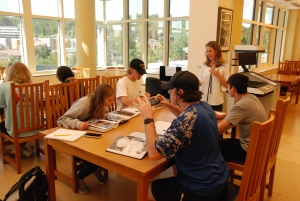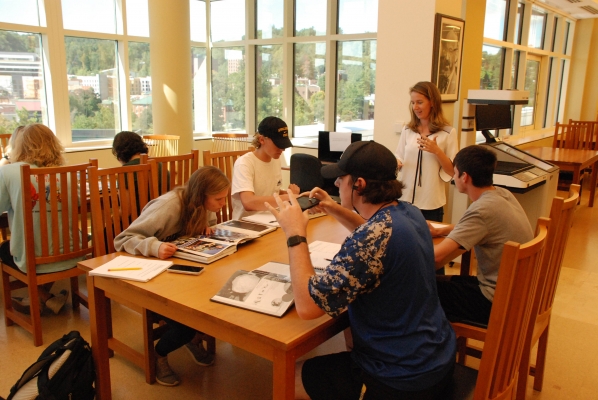As I talked with Dr. Bethany Mannon, I could not help but admire her love and passion for English. From her work in the writing center to teaching many students I found our conversation to be very exciting. She had joined the English Department in 2018 as a Visiting Assistant Professor. Dr. Mannon is now an Assistant Professor of Rhetoric and Writing Studies and starting in the Spring of January 2021 she will begin her role as Director of Composition.
When Dr. Mannon started college, she thought she would triple major in English, Political Science, and Spanish because those were the subjects that she enjoyed and excelled in. But over time, she narrowed it down to English because she was drawn to how powerful language is in shaping the way we think, how we experience the world, and how people relate to each other.
As an undergraduate at the University of Connecticut, she worked in the writing center and loved it. She enjoyed helping students with their writings because the help that students needed was never the same. Some may need help with starting their paper, while others need help with polishing up certain parts of their paragraphs. While working at the writing center, her advisor told her that she could go to graduate school in rhetoric and composition, which came as a surprise to her, because she had always thought of English as being focused just on literature. As a result of her interest in this area, she got her Master’s and Doctorate degrees at Penn State University.
In early September, Dr. Mannon had her article “Centering the Emotional Labor of Writing Tutors” accepted for publication in the Writing Center Journal. In this article, she is focusing on teaching writing as an emotional piece instead of just being taught cognitively or intellectually. Dr. Mannon finds that being a tutor or teacher is not always easy and that
“Sometimes you have to suppress your own feelings when helping someone because you might be anxious about your own work, but you just have to temporarily put it aside to be fully present.”
As the incoming Director of Composition, a role she will initiate in the Spring, her future plans are creating some upper-level writing courses, supporting the faculty, and finding a sustainable way to teach classes online. She wants to create an upper-level course that looks more at the rhetoric, public discourse, and the role writing plays in social movements. These courses will help students who are really passionate about writing gain more experience by making them think rhetorically.
For a research project last year, Dr. Mannon interviewed 50 undergraduate students that came from religious backgrounds because she wanted to learn if there were any connections between their experiences with their religious background and their academic writing. From her research, she found that many religious students had learned a lot of rhetoric before they even got to college and showed up in first year writing classes with developed skills. The students had often spent a lot of time thinking about “how do I share my story, how do I analyze this text, and understand what is going on, or how do I debate a point with other groups of people.” Dr. Mannon is currently working on another research project focused on online teaching. In this project, she wants to know what faculty are experiencing in their classes because teaching online is fairly new to most.
Dr. Mannon lives close to Asheville, North Carolina, and loves driving and making the climb up the mountain to Boone. She loves the vast woody landscape surrounding Boone and likes how there are many great independently owned restaurants in town. Before Covid-19 she used to run a loop from Stanford Hall to the long hill on Rivers Street every morning to enjoy our beautiful campus. She finds that the students at App State are more quirky than students at other universities where she has taught. The students here are not the typical generic college students that blend in with the crowd. Instead, they are curious, interested, and have various distinct characteristics that make it fun to teach them at ASU.
Credits: Written by Jason Xiong, photo supplied by Bethany Mannon.

